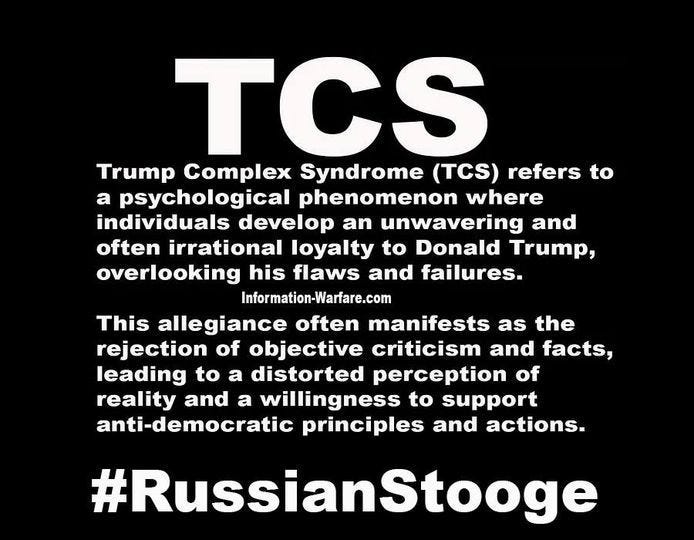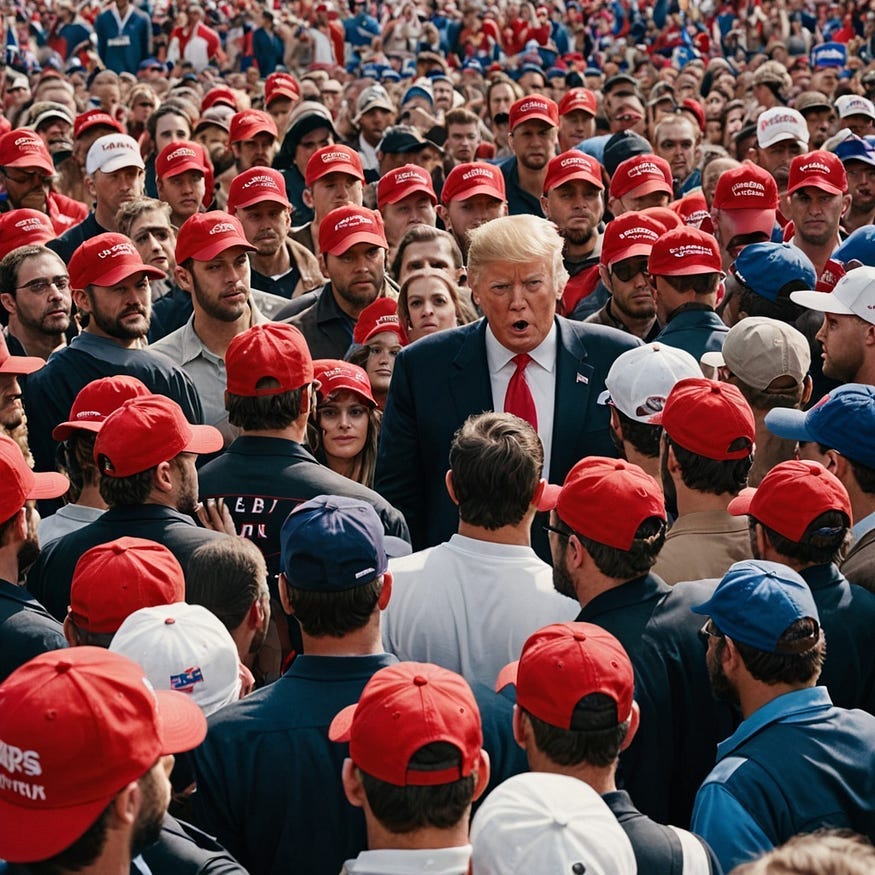Trump Complex Syndrome (TCS): Unraveling the MAGA Movement
How Unwavering Loyalty to Donald Trump and the MAGA Movement Reflects Deeper Psychological and Sociopolitical Dynamics

Trump Complex Syndrome (TCS), MAGA, and Herd Mentality: A Comprehensive Analysis
Introduction
In recent years, the political landscape of the United States has been profoundly influenced by the rise of Donald Trump and his “Make America Great Again” (MAGA) movement. A striking phenomenon that has emerged alongside this movement is what some have termed Trump Complex Syndrome (TCS). This term describes a psychological state where individuals develop an unwavering loyalty to Trump, often overlooking his flaws and failures. Coupled with the broader concept of herd mentality, TCS provides a framework to understand the collective behavior of Trump’s most ardent supporters.
This article aims to dissect the roots, manifestations, and implications of TCS and MAGA, particularly in the context of herd mentality. By exploring these concepts, we can gain a deeper understanding of the psychological and sociopolitical factors driving this significant segment of the American population.
The Origins of Trump Complex Syndrome (TCS)
Trump Complex Syndrome can be seen as an evolution of political loyalty taken to an extreme. Traditionally, political allegiance in democracies involves a certain level of critical engagement, where supporters are willing to praise leaders when they do well and critique them when they falter. TCS, however, represents a departure from this norm, characterized by an almost unshakeable belief in Donald Trump, regardless of his actions or statements.
The origins of TCS can be traced back to several key factors:
Populist Appeal: Trump’s rhetoric has consistently tapped into the fears, anxieties, and aspirations of a segment of the American population. His promises to restore lost jobs, curb immigration, and put “America First” resonated deeply with those who felt left behind by globalization and technological change.
Media Influence: The rise of partisan media outlets, particularly right-wing platforms like Fox News, Breitbart, and others, has played a crucial role in shaping and reinforcing the beliefs of Trump’s supporters. These outlets often present Trump in a highly favorable light, downplaying or dismissing his controversies and failures.
Social Media Echo Chambers: Social media platforms like Twitter and Facebook have enabled the rapid spread of misinformation and conspiracy theories. Within these echo chambers, Trump supporters are frequently exposed only to information that confirms their existing beliefs, reinforcing their loyalty and deepening their distrust of opposing viewpoints.
Charismatic Leadership: Trump’s charisma and unorthodox style have also contributed to the development of TCS. His ability to command attention, defy political norms, and present himself as a “strongman” has endeared him to many who view traditional politicians as weak or corrupt.
MAGA: More Than Just a Slogan
The “Make America Great Again” (MAGA) slogan became the rallying cry for Trump’s campaign and subsequent presidency. It encapsulated a sense of nostalgia for a perceived golden age of American dominance and prosperity, particularly among white, working-class Americans. MAGA is more than just a slogan; it is a symbol of a movement that blends nationalism, populism, and cultural conservatism.
Cultural Identity: For many of Trump’s supporters, MAGA represents a defense of traditional American values and a pushback against the progressive social changes of recent decades. This includes opposition to LGBTQ+ rights, immigration, and movements for racial justice, which are perceived as threats to the cultural fabric of the nation.
Economic Frustration: The MAGA movement also taps into economic grievances. Many of Trump’s supporters are from areas that have experienced industrial decline and job loss. Trump’s promises to revive manufacturing, renegotiate trade deals, and bring jobs back to America struck a chord with these communities.
Anti-Establishment Sentiment: A significant aspect of MAGA is its anti-establishment ethos. Trump’s supporters often view him as a political outsider who is unafraid to challenge the status quo, drain the “swamp,” and fight against what they see as a corrupt and elitist political system.
Herd Mentality and Political Behavior
Herd mentality, or groupthink, refers to the tendency of individuals to conform to the beliefs and behaviors of the larger group, often at the expense of critical thinking. In the context of TCS and MAGA, herd mentality manifests in several ways:
Conformity and Group Identity: Within the MAGA movement, there is a strong sense of group identity. Supporters often see themselves as part of an “us versus them” battle, where loyalty to Trump and MAGA is synonymous with loyalty to the country. This strong in-group identity discourages dissent and fosters conformity.
Resistance to Criticism: Herd mentality within the MAGA movement often leads to a rejection of criticism, both of Trump and the movement itself. Critics, whether from the media, political opponents, or even within the Republican Party, are often dismissed as part of a broader conspiracy against Trump.
Amplification of Beliefs: Social media and partisan media play a significant role in amplifying and reinforcing the beliefs of the MAGA movement. The algorithms of social media platforms tend to show users content that aligns with their existing views, leading to a feedback loop that intensifies their beliefs.
Moral Justification: Herd mentality can also lead to moral justification of questionable actions. For example, the actions of the January 6 Capitol rioters were justified by some within the MAGA movement as a necessary defense of democracy, despite the violence and illegality involved.
The Psychological Underpinnings of TCS and Herd Mentality
The development of TCS and the susceptibility to herd mentality can be explained by several psychological theories:
Cognitive Dissonance: Cognitive dissonance occurs when individuals experience discomfort due to holding conflicting beliefs or behaviors. In the context of TCS, Trump supporters may experience dissonance when confronted with negative information about Trump. To reduce this discomfort, they may dismiss or rationalize the information, reinforcing their loyalty.
Confirmation Bias: Confirmation bias is the tendency to seek out and interpret information in a way that confirms one’s preexisting beliefs. TCS is reinforced by confirmation bias, as supporters actively seek out news and opinions that validate their positive views of Trump.
Social Identity Theory: Social identity theory suggests that individuals derive a sense of identity and self-esteem from their group memberships. For MAGA supporters, being part of the movement provides a strong sense of identity and belonging, making them more likely to conform to group norms and resist opposing views.
Authority and Obedience: The work of psychologist Stanley Milgram on authority and obedience can also help explain TCS. Trump’s authoritarian leadership style and the deference it commands among his supporters contribute to the uncritical loyalty seen in TCS.
The Implications of TCS and Herd Mentality
The persistence of TCS and herd mentality within the MAGA movement has significant implications for American democracy and society:
Polarization: TCS and herd mentality contribute to the deepening political polarization in the United States. The rigid loyalty to Trump and the rejection of opposing viewpoints create a divide that is difficult to bridge, undermining efforts at bipartisan cooperation and dialogue.
Threats to Democratic Institutions: The uncritical support for Trump, even in the face of actions that undermine democratic norms (such as attempts to overturn election results), poses a serious threat to democratic institutions. The willingness of some to support anti-democratic actions in the name of Trumpism is a concerning development.
Impact on Public Discourse: The influence of TCS and herd mentality has also degraded the quality of public discourse. The spread of misinformation, conspiracy theories, and the rejection of objective facts have made it increasingly difficult to engage in reasoned and informed debate.
Potential for Violence: The herd mentality within the MAGA movement, coupled with the rhetoric of certain leaders, has the potential to incite violence, as seen on January 6, 2021. The willingness of some to resort to violence in defense of their beliefs is a dangerous consequence of these psychological dynamics.
Conclusion
Trump Complex Syndrome, the MAGA movement, and herd mentality represent a powerful confluence of psychological and sociopolitical factors that have reshaped American politics in recent years. Understanding these phenomena is crucial for addressing the challenges they pose to democracy and social cohesion.
As the United States continues to grapple with the legacy of the Trump era, it is essential to foster critical thinking, promote media literacy, and encourage dialogue across political divides. Only by addressing the underlying causes of TCS and herd mentality can we hope to restore a more informed and engaged electorate, capable of navigating the complexities of contemporary politics.


